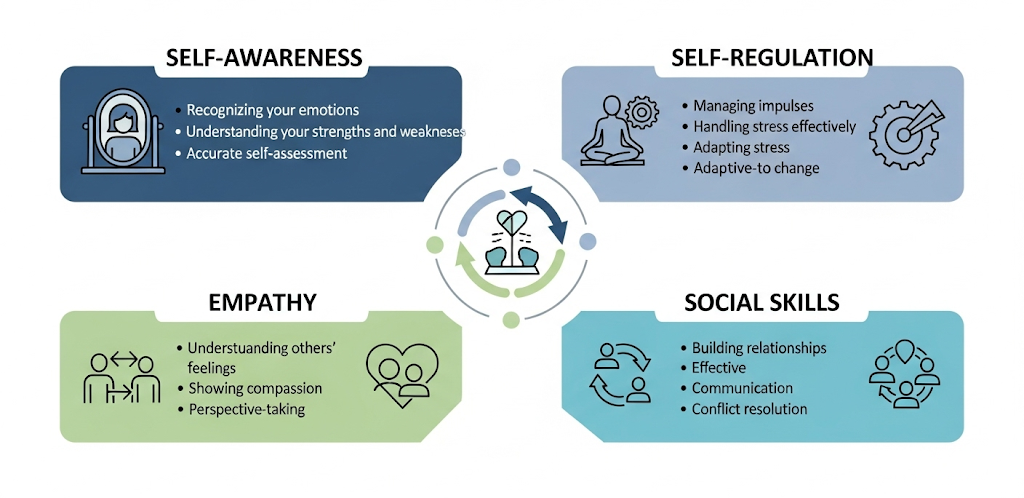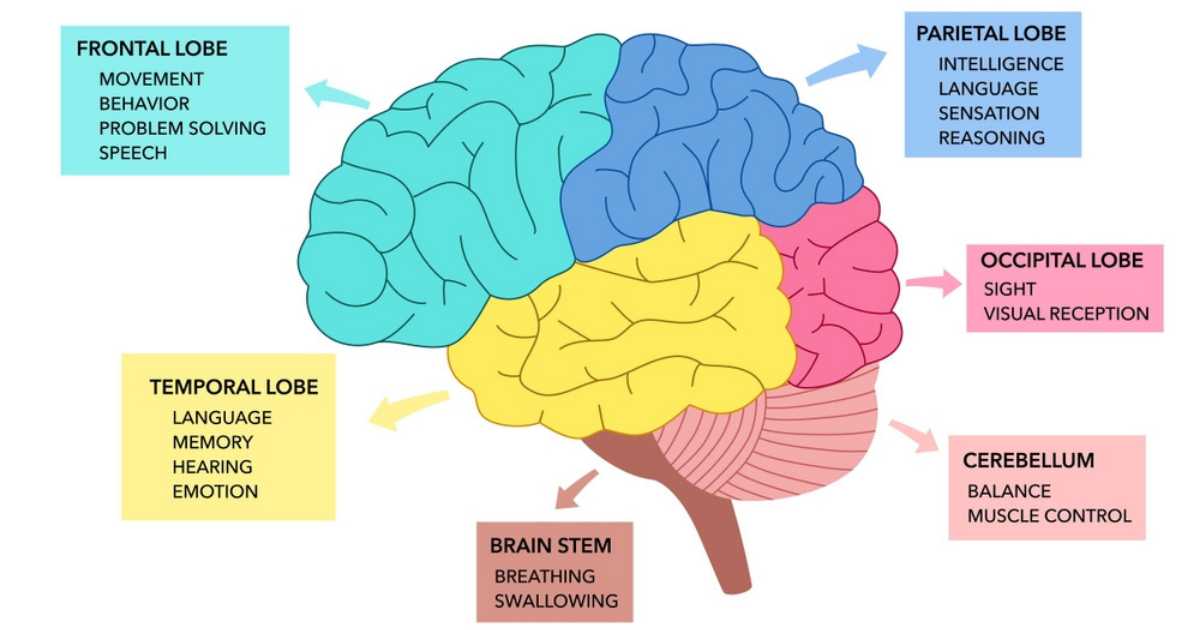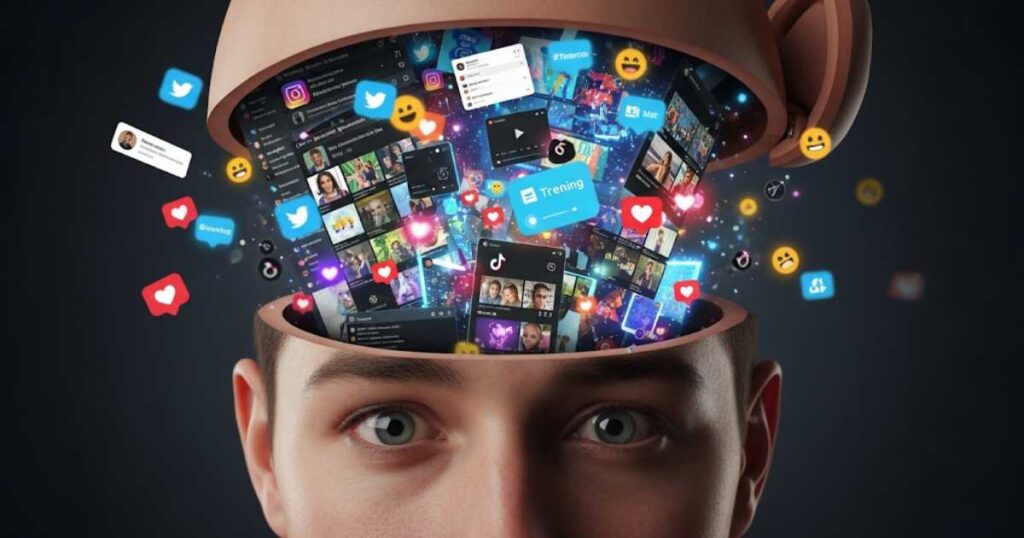Remember that friend who somehow always knows exactly what to say when you’re having a meltdown over burnt toast (because it wasn’t really about the toast, was it)? Or that colleague who can navigate a heated meeting like a diplomatic ninja, leaving everyone feeling heard and the problem actually solved? Chances are, you’ve witnessed emotional intelligence in action – and probably wished you could bottle it up and take a swig whenever your own emotions decide to throw a house party without your permission.
What is emotional intelligence, you might wonder? Emotional intelligence, often abbreviated as EQ (because apparently everything needs an acronym these days), isn’t just another buzzword that consultants throw around at corporate retreats. It’s actually one of the most crucial skills you can develop, both for your personal relationships and professional success. Think of it as the user manual for the human operating system – except this manual actually makes sense and doesn’t require you to have an engineering degree to understand it.
What is Emotional Intelligence By The Way?

The question “What is emotional intelligence?” has a surprisingly straightforward answer. At its core, emotional intelligence is your ability to recognise, understand, and manage emotions – both your own and those of others. It’s like having an internal GPS for the complex world of human feelings, helping you navigate everything from awkward small talk at the office coffee machine to serious heart-to-hearts with loved ones.
The concept gained serious traction in the 1990s when psychologist Daniel Goleman wrote about it, though researchers like Peter Salovey and John Mayer had been exploring the idea since the late 1980s. They basically looked at the chaos of human emotions and thought, “You know what? There’s got to be a better way to handle all this mess.”
And they were right. Unlike IQ, which is relatively fixed (sorry, but cramming for that online IQ test isn’t going to boost your intelligence much), what emotional intelligence shows us is something much more hopeful – these skills can be developed and improved throughout your life. It’s like a muscle that gets stronger with use – except this muscle helps you avoid saying exactly the wrong thing at exactly the wrong moment.
The Four Pillars of Emotional Intelligence
When exploring what emotional intelligence is, it’s important to understand that it isn’t just one skill – it’s more like a Swiss Army knife of interpersonal abilities. Goleman identified four key components that work together to make someone emotionally intelligent:
1. Self-Awareness: The “Know Thyself” Department
Self-awareness is your ability to recognise and understand your own emotions as they happen. It’s the difference between thinking “I’m fine” while steam shoots out of your ears cartoon-style, and actually acknowledging “I’m frustrated because this project isn’t going as planned, and I need to take a step back.”
People with high self-awareness are like emotion detectives investigating their own inner world. They notice when their mood shifts, understand what triggers certain reactions, and can identify their emotional patterns. They’re the ones who say things like, “I know I get cranky when I’m hungry, so let me grab a snack before we have this conversation” – and everyone around them breathes a collective sigh of relief.
Self-awareness also includes understanding your strengths, weaknesses, and values. It’s about being honest with yourself without being brutally self-critical. Think of it as having a realistic self-portrait rather than either a funhouse mirror distortion or an overly flattering Instagram filter version of yourself.
2. Self-Regulation: The Internal Thermostat
If self-awareness is knowing what you’re feeling, self-regulation is deciding what to do about it. It’s your emotional thermostat, helping you maintain a comfortable temperature even when external circumstances are heating up or cooling down dramatically.
Self-regulation doesn’t mean suppressing emotions or pretending they don’t exist – that’s about as effective as trying to hold a beach ball underwater. Instead, it’s about managing your responses appropriately. It’s the pause between feeling annoyed and sending that sarcastic email, the deep breath before responding to criticism, or the choice to step away from a heated argument rather than say something you’ll regret.
People with strong self-regulation skills are adaptable, comfortable with change, and maintain their composure under pressure. They’re the ones who can receive feedback without getting defensive, admit mistakes without falling apart, and stay focused on solutions rather than getting stuck in problem mode.
3. Empathy: The Emotional Translator
Empathy is your ability to understand and share the feelings of others. It’s like having a universal translator for emotions, helping you decode what someone else is experiencing even when they’re not explicitly telling you.
There are actually different types of empathy. Cognitive empathy is understanding intellectually what someone else is feeling, like knowing your friend is sad because they just went through a breakup. Emotional empathy is actually feeling those emotions yourself – tearing up when you see them cry. Compassionate empathy combines both and adds the motivation to help.
Highly empathetic people are skilled at reading nonverbal cues, picking up on subtle changes in tone or body language, and understanding the emotional subtext of conversations. They’re the friends who notice when you say you’re “fine” but your shoulders are up around your ears, and they gently probe to see what’s really going on.
4. Social Skills: The Relationship Mechanics
Social skills are where all the other components come together in your interactions with others. It’s emotional intelligence in action – using your self-awareness, self-regulation, and empathy to build and maintain relationships, communicate effectively, and navigate social situations.
This includes everything from basic communication and active listening to more complex skills like conflict resolution, leadership, and influence. People with strong social skills are often described as charismatic or naturally good with people, but it’s not magic – it’s the result of understanding and responding appropriately to emotional and social cues.
They know how to give feedback that motivates rather than devastates, how to disagree without being disagreeable, and how to make others feel valued and understood. They’re the people who remember details about your life, ask thoughtful follow-up questions, and somehow make you feel like the most interesting person in the room.
Why Emotional Intelligence Matters More Than You Think
You might be wondering why emotional intelligence has become such a big deal. After all, didn’t we get along just fine for centuries without giving it a fancy name and turning it into corporate training modules?
Well, yes and no. The skills have always been important, but our understanding of their impact has grown dramatically. Research shows that emotional intelligence affects virtually every aspect of our lives:
In the workplace, studies suggest that EQ accounts for 58% of job performance across all types of careers. It’s not just about being “nice” – emotionally intelligent employees are better at teamwork, leadership, customer service, and handling stress. They’re also less likely to burn out or engage in counterproductive behaviours like office gossip or passive-aggressive email wars.
In relationships, emotional intelligence is like relationship insurance. People with higher EQ have more satisfying marriages, stronger friendships, and better family relationships. They’re better at resolving conflicts, expressing their needs, and providing support to others. Plus, they’re generally more pleasant to be around, which never hurts.
For mental health, emotional intelligence serves as a protective factor against anxiety, depression, and other mental health challenges. When you understand your emotions and have strategies for managing them, you’re less likely to be overwhelmed by life’s inevitable ups and downs.
In leadership, emotional intelligence often matters more than technical skills. Leaders with high EQ are better at inspiring and motivating others, building trust, managing change, and creating positive work cultures. They’re the bosses people actually want to work for, not just the ones they have to tolerate.
The Science Behind the Feels

The research supporting emotional intelligence is pretty compelling, even if some of it makes you wonder who volunteers for these studies. Scientists have found that emotional intelligence activates different parts of the brain than traditional intelligence, involving areas responsible for memory, decision-making, and self-control.
Neuroscientists have discovered that emotional reactions happen faster than rational thoughts – your amygdala (the brain’s alarm system) can hijack your responses before your prefrontal cortex (the rational thinking part) even knows what’s happening. This is why you sometimes find yourself saying or doing things you immediately regret. Emotional intelligence helps you build a better communication system between these brain regions.
Studies have also shown that people with higher emotional intelligence have lower levels of stress hormones like cortisol and stronger immune systems. It turns out that being good at managing emotions isn’t just psychologically beneficial – it’s physically healthy too.
Signs You Might Need an EQ Tune-Up
Don’t worry, we’re not about to diagnose you through an article (that would require a different kind of degree and much higher malpractice insurance). But understanding what emotional intelligence means, recognising when these skills might need some attention:
You find yourself constantly surprised by other people’s reactions to your words or actions. If you frequently think “Where did that come from?” about other people’s responses, you might need to work on reading emotional cues.
Your emotions feel like they’re driving the bus while you’re just along for the ride. If you often feel overwhelmed by your feelings or find yourself reacting impulsively, self-regulation skills could be helpful.
You struggle with conflict or avoid it entirely. If disagreements make you want to hide under your desk or come out swinging, there’s room for improvement in managing interpersonal challenges.
You have difficulty maintaining close relationships or feel like people don’t “get” you. While some personality differences are normal, persistent relationship struggles often point to communication or empathy gaps.
You feel constantly stressed or burned out, especially in social or work situations. Emotional intelligence skills can help you manage stress and navigate challenging environments more effectively.
How to Build Your Emotional Intelligence
The good news is that when you understand what is emotional intelligence, you realise these skills can be developed at any age. It’s not like learning calculus (thank goodness) – it’s more like learning to cook. You start with basic techniques, practice regularly, and gradually take on more complex recipes.
Developing Self-Awareness
Start by becoming an emotion detective in your own life. Keep a simple emotion journal for a week – just note what you’re feeling and what might have triggered it. Don’t judge the emotions or try to fix them; just observe. You might be surprised by the patterns you notice.
Practice the “name it to tame it” technique. When you feel a strong emotion, try to identify it specifically. Instead of “bad” or “upset,” get more precise: frustrated, disappointed, overwhelmed, irritated. Research shows that simply naming emotions can reduce their intensity.
Ask for feedback from trusted friends or family members. Sometimes others see our patterns more clearly than we do. Ask questions like “What do you notice about my mood when I’m stressed?” or “How do I come across when I’m excited about something?”
Building Self-Regulation Skills
Learn to press the pause button. When you feel a strong emotion rising, try counting to ten, taking three deep breaths, or excusing yourself to the bathroom (the universal escape route). This gives your rational brain time to catch up with your emotional brain.
Develop healthy coping strategies for different emotions. Maybe a quick walk helps when you’re frustrated, or calling a friend helps when you’re anxious. Having a toolkit ready makes it easier to respond rather than react.
Practice reframing situations. Instead of “This is terrible,” try “This is challenging” or “This is an opportunity to learn something.” It sounds cheesy, but changing your internal narrative can genuinely shift your emotional response.
Enhancing Empathy
Become a people-watcher (in a non-creepy way). Practice observing body language, facial expressions, and tone of voice. Notice how people’s nonverbal communication often tells a different story than their words.
Listen more than you speak. Really listen – not just waiting for your turn to talk, but trying to understand what the other person is experiencing. Ask follow-up questions and reflect back what you’re hearing.
Read fiction. Seriously. Research shows that people who read literary fiction score higher on empathy tests. Stories help us practice seeing the world through different perspectives and understanding complex emotional situations.
Improving Social Skills
Practice active listening techniques like summarising what someone has said, asking clarifying questions, and reflecting emotions (“It sounds like you’re really frustrated about this”).
Work on giving and receiving feedback gracefully. Learn to deliver criticism in a way that focuses on behaviour rather than personality, and practice receiving feedback without getting defensive.
Study the social dynamics in your environment. Notice who seems to navigate relationships easily and what they do differently. Sometimes the best learning comes from observation.
Emotional Intelligence in Different Life Contexts
1. At Work
In the workplace, emotional intelligence shows up in countless ways. It’s the manager who notices when team morale is low and addresses it before productivity suffers. It’s the salesperson who reads a client’s hesitation and adjusts their approach accordingly. It’s the colleague who can disagree with your ideas while making you feel respected and heard.
Emotionally intelligent employees are often the ones who get promoted, not necessarily because they’re the smartest or most technically skilled, but because they’re effective at working with others. They’re the people others want to collaborate with, the ones who can manage up and down the hierarchy, and the ones who help create positive work environments.
If you’re in a leadership role, emotional intelligence becomes even more critical. Your emotions and reactions set the tone for your entire team. A leader who can stay calm under pressure, show genuine appreciation for good work, and handle difficult conversations with grace creates a culture where others can do their best work.
2. In Relationships
Personal relationships are where understanding what emotional intelligence really is shines. It’s the difference between partners who fight about the dishes and partners who understand that the real issue is feeling unappreciated. It’s the friend who knows when you need advice and when you just need someone to listen.
Emotional intelligence helps you communicate your needs clearly, understand your partner’s love language, and navigate the inevitable conflicts that arise in any close relationship. It’s about creating emotional safety – the sense that you can be vulnerable with someone without being judged or rejected.
With children, emotional intelligence is particularly important. Kids are like emotional sponges, absorbing not just what you say but how you say it and what you’re feeling when you say it. Parents with high EQ raise children who are better at managing their own emotions and building healthy relationships.
3. In Parenting:
Speaking of children, emotional intelligence becomes crucial when we consider it as one of the most valuable gifts you can pass on to the next generation. Kids who learn these skills early have advantages that last a lifetime – better academic performance, stronger friendships, and greater resilience in the face of challenges.
This doesn’t mean turning every tantrum into a psychology lesson (because let’s be real, sometimes you just need to get through the grocery store). But it does mean helping children identify and name their emotions, teaching them coping strategies, and modelling healthy emotional responses yourself.
The “emotion coaching” approach involves helping children understand their feelings rather than dismissing them. Instead of “Don’t be sad,” try “I can see you’re feeling sad. That must be really hard. Let’s talk about what’s making you feel this way.”
Common Myths and Misconceptions
Let’s clear up some confusion about what emotional intelligence is, because like most popular concepts, it’s accumulated some myths along the way.
Myth: Emotionally intelligent people are always happy and positive. Reality: They experience the full range of human emotions but are better at managing them appropriately. Sometimes being emotionally intelligent means acknowledging that a situation genuinely sucks and responding accordingly.
Myth: EQ is just about being nice. Reality: Emotional intelligence sometimes requires difficult conversations, setting boundaries, or making unpopular decisions. It’s about being effective, not just agreeable.
Myth: Women naturally have higher emotional intelligence than men. Reality: While there may be some average differences in certain aspects of EQ, there’s huge individual variation. Anyone can develop these skills regardless of gender.
Myth: Emotional intelligence means suppressing negative emotions. Reality: It’s about experiencing emotions fully while choosing your responses wisely. Suppressing emotions usually backfires spectacularly.
Myth: You either have it or you don’t. Reality: Emotional intelligence can be learned and improved at any age. Your brain remains capable of developing new emotional patterns throughout your life.
The Dark Side of Emotional Intelligence
Like any powerful tool, emotional intelligence can be misused. Some people develop these skills not to build genuine connections but to manipulate others more effectively. They become expert at reading emotional cues and using that information for personal gain rather than mutual benefit.
There’s also such a thing as emotional intelligence fatigue. People who are highly attuned to emotions – their own and others’ – can become overwhelmed by the constant processing of emotional information. Sometimes ignorance really is bliss, and being too emotionally aware can be exhausting.
Additionally, some people use the concept of emotional intelligence to dismiss or invalidate others’ feelings. “You’re just not being emotionally intelligent about this” can become a way to shut down legitimate concerns or avoid addressing real problems.
The key is using emotional intelligence ethically and recognising that being emotionally skilled doesn’t make you emotionally superior to others.
Measuring Emotional Intelligence
Unlike IQ tests, measuring emotional intelligence is more complex and controversial. There are several different assessment tools, each with its own strengths and limitations.
Some tests use self-reporting – basically asking you how emotionally intelligent you think you are. The problem is that people who lack self-awareness (a key component of EQ) are unlikely to accurately assess their own abilities. It’s like asking someone with no sense of rhythm to rate their dancing skills.
Other assessments use ability-based testing, presenting scenarios and asking you to identify emotions or choose appropriate responses. These are more objective but may not capture how you actually behave in real-life situations when stress, time pressure, or personal relationships are involved.
360-degree feedback, where colleagues, friends, and family members rate your emotional intelligence, can provide valuable insights but may be influenced by relationship dynamics and personal biases.
The bottom line is that while these assessments can be helpful for self-reflection and development planning, they’re not perfect measures. The most reliable indicator of your emotional intelligence is probably how your relationships are going and how effectively you handle life’s emotional challenges.
Emotional Intelligence in the Digital Age
The rise of digital communication has created new challenges for emotional intelligence. It’s harder to read emotional cues through text messages, emails, and social media posts. Misunderstandings multiply when you can’t see facial expressions or hear the tone of voice.
Social media has also created new forms of emotional complexity. The pressure to present a perfect life online, the comparison trap of seeing others’ highlight reels, and the dopamine hits from likes and comments all affect our emotional well-being in ways we’re still learning to understand.
Digital emotional intelligence involves skills like knowing when to have difficult conversations in person rather than via text, understanding how your online communication might be perceived by others, and managing your emotional responses to social media and digital interactions.
It also means developing healthy boundaries around technology use and recognising how digital devices affect your emotional state and relationships.
Cultural Considerations
Emotional intelligence isn’t culturally neutral. What counts as appropriate emotional expression varies dramatically across cultures. Direct eye contact might show confidence and sincerity in one culture but be considered disrespectful in another. The volume and expressiveness that feels warm and engaging to some might feel overwhelming or rude to others.
This means that developing emotional intelligence requires cultural competence – understanding that your way of expressing and interpreting emotions isn’t universal. What feels emotionally intelligent in one context might miss the mark entirely in another.
For people working in diverse environments or multicultural relationships, this adds another layer of complexity to emotional intelligence. It’s not just about reading emotions accurately but understanding the cultural context that shapes how emotions are expressed and interpreted.
The Future of Emotional Intelligence
As artificial intelligence becomes more sophisticated, emotional intelligence becomes increasingly valuable as a uniquely human skill. While machines can process information and even recognise emotional patterns, the nuanced understanding and authentic connection that comes with human emotional intelligence remains irreplaceable.
We’re also learning more about the neuroscience of emotions and developing new techniques for building emotional skills. Virtual reality training programs let people practice difficult conversations in safe environments. Biofeedback apps help people learn to regulate their physiological responses to stress.
The growing focus on mental health and well-being in schools and workplaces is also creating more opportunities to develop emotional intelligence systematically rather than leaving it to chance.
Putting It All Together
Emotional intelligence isn’t about becoming a perfect, always-calm, perpetually understanding human being (which would be kind of creepy anyway). It’s about becoming more skilful at navigating the messy, complicated, beautiful world of human emotions and relationships.
It’s recognising that the annoying coworker might be having a terrible day, that your partner’s criticism might be coming from a place of caring, and that your own emotional reactions contain valuable information about your needs and values.
Developing emotional intelligence is a lifelong journey, not a destination. There will always be situations that challenge you, emotions that surprise you, and relationships that require you to grow in new ways. The goal isn’t perfection but progress – becoming a little more self-aware, a little more empathetic, and a little more skilled at connecting with others.
In a world that often feels increasingly divided and disconnected, emotional intelligence offers a path toward greater understanding and more meaningful relationships. It’s the bridge between knowing something intellectually and living it authentically, between good intentions and effective actions, between being smart and being wise.
So the next time you find yourself in an emotionally charged situation – whether it’s a heated work meeting, a relationship conflict, or just trying to figure out why your neighbour’s music is making you want to scream – remember that you have more control than you might think. You can’t always control what happens to you, but you can develop the skills to choose how you respond.
And that, ultimately, is what emotional intelligence is all about: the power to choose your response rather than being at the mercy of your reactions. It’s not about suppressing your emotions or pretending they don’t matter – it’s about partnering with them to create the kind of life and relationships you actually want.
After all, we’re all just humans trying to figure out this complicated business of living and loving and working together. Emotional intelligence is simply one of the most useful tools we have for making that process a little easier, a little more successful, and a lot more fulfilling.
Now, if only they taught this stuff in school along with algebra and the periodic table. But that’s a topic for another article – probably titled “Why Didn’t Anyone Tell Me This Sooner: Essential Life Skills They Forgot to Teach Us.”



